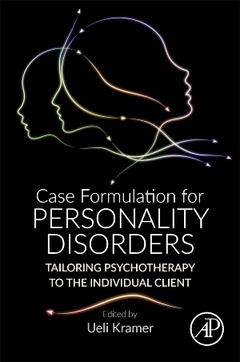Case Formulation for Personality Disorders Tailoring Psychotherapy to the Individual Client
Coordonnateur : Kramer Ueli

Case Formulation for Personality Disorders provides clinical guidance on how to build effective treatment plans for patients presenting with personality disorders. Anchored within a disorder-specific approach, the present volume reviews the evidence base of case formulation methodology. The book takes an integrative and differentiated approach to case formulation, with multiple methods of case formulation, all specifically adapted to the psychotherapy of personality disorders, illustrated with many case examples.
1. Case Formulation in Dialectical Behaviour Therapy 2. Transference-Focused Psychotherapy: Structural Diagnosis as the Basis for Case Formulation 3. Case Formulations in Mentalization-Based Treatment (MBT) for Patients With Borderline Personality Disorder 4. The Corrective Experience of Getting a Life: Case Formulation Using General Psychiatric Management as a Framework to Facilitate Remission and Recovery 5. Case Formulation in Schema Therapy: Working with the Mode Model 6. Cognitive Analytic Therapy: A Relational Approach to Young People with Severe Personality Disorder 7. Case Conceptualization in Clarification-Oriented Psychotherapy 8. Formulation of Functioning for Avoidant Personality Disorder in Metacognitive Interpersonal Therapy 9. What Might Work When Nothing Seems to Work: Case Formulation in the Treatment of Antisocial Personality Disorder in a Forensic Mental Health Setting 10. Formulating Key Psychosocial Mechanisms of Psychopathology and Change in Interpersonal Reconstructive Therapy 11. Motives, Defences, and Conflicts in the Dynamic Formulation for Psychodynamic Psychotherapy Using the Idiographic Conflict Formulation Method 12. Case Formulation in Cognitive and Behavioural Therapy 13. Conceptualizing Borderline Personality Disorder Within an Emotional Disorders Framework: Implications for Treatment With the Unified Protocol 14. Plan Analysis and the Motive-Oriented Therapeutic Relationship 15. Tailored Treatment Planning for Individuals with Personality Disorders: The Operationalized Psychodynamic Diagnosis (OPD) Approach 16. Case Formulation in Interpersonal Defence Theory: A Process Model of Interpersonal Phenomena that Play Key Roles in Psychopathology and Psychotherapy 17. Alliance-Focused Formulation: A Work in Process 18. Emotion-Based Case Formulation for Personality Disorders
Ueli Kramer, PhD, is Professor for Psychiatry and Psychotherapy, psychotherapy researcher and clinical psychotherapist according to Federal Law, Director of the Institute of Psychotherapy, at the Department of Psychiatry, University of Lausanne, Switzerland. He holds an adjunct appointment at the Department of Psychology, University of Windsor, Canada. His research focuses on process and outcome in psychotherapy, in particular the mechanisms of change in treatments of personality disorders, and case formulation in personality disorders. Dr. Kramer has published over 180 scientific contributions, and ten books. He is a broadly trained clinician, author and editor, working from an integrative psychotherapy perspective. Dr. Kramer is Past President of the European Society for Psychotherapy Research (EU-SPR) and current President of the European Society for the Study of Personality Disorders (ESSPD). Dr. Kramer’s research has been supported by a number of grants, and has been recognized by the Inger Salling Foundation, the Society for Psychotherapy Research, the Hamburg GePS Society for Personality Disorders, the AEMD Marina Picasso Foundation and the Society for the Exploration of Psychotherapy Integration.
- Provides individualized assessment and measurement in practice
- Uses 18 case formulation methods for treating personality disorders
- Identifies evidence-based effective treatment
- Includes real life case examples
Date de parution : 01-2019
Ouvrage de 432 p.
15x22.8 cm
Thème de Case Formulation for Personality Disorders :
Mots-clés :
Alliance; Antisocial personality disorder; Assessing interpersonal motivation in transcripts; Attachment; Autobiographical memory test; Avoidant personality disorder; Behaviour assessment; Borderline personality disorder (BPD)Case formulation; Borderline personality disorder; Case conceptualization; Case formulation; Case formulations; Clarification oriented therapy; Clarification-oriented psychotherapy; Clinical management; Cognitive analytic therapy; Cognitive behavioural therapy; Comorbidity; Conflicts; Copy process theory; Diagnosis; Dialectical behaviour therapy; Dynamic adequacy; Emotional disorders; Emotional processing; Emotional transformation; Forensic mental health; Functional analysis; General psychiatric management (GPM)Interpersonal hypersensitivity; Gift of love; Idiographic Conflict Formulation; Instrumental function; Integration; Interpersonal defence theory; Interpersonal defences; Life stressors; MBT; Mentalization-based treatment; Mentalizing; Metacognitive interpersonal therapy; Mode model; Motive-oriented therapeutic relationship; Narcissistic personality disorder; Noncoordinating interpersonal behaviour patterns; Obsessive-compulsive personality; Offending; OPD; Operationalized psychodynamic diagnoses; Personality disorders; Personality organization; Plan analysis; Process; Process-outcome; Professional training; Psychodynamic factors; Psychodynamic; Psychotherapy process-outcome; Psychotherapy; RCT; Repression; Risk assessment; Ruptures; Schema therapy; Schema; Structural analysis of social behaviour (SASB)Structural interview; Structured Interview of Personality Organization; Substance use; Therapeutic principles; Therapy relationship; Transdiagnostic; Transference-focused psychotherapy; Treatment planning; Treatment; Unified protocol; Young people; Youth



